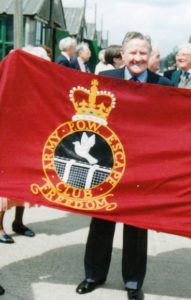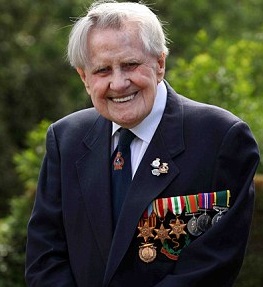Tommy Wells was one of the ‘original’ ELMS members and was the Standard Bearer for the Army POW Escape Club (Northern Branch). He attended the first Reunion at Eden Camp with the Army Escapers in the early ‘90s and attended every Reunion since then. For over twenty years Tommy visited secondary schools in the Newcastle area to give talks about his experiences and the futilities of war; generations of Newcastle school children will remember their chats with him. He only spoke about his wartime experiences when asked – ‘War,’ he said, ‘was a serious business, and no one should have to go through it.’
Tommy joined the Territorial Army in 1937 when he was 17 years old, so that he could have a holiday – to him, the two week training camp meant going away and seeing new places! He signed on with 149 Field Ambulance Unit (Royal Army Medical Corps), at Hutton Terrace, Newcastle, for a four year term but in 1939, three days before war broke out, he was mobilised and reported for duty in a school in Sandyford, Newcastle. Tommy was moved down to Oxfordshire for equipment and training before moving to Cherbourg, France, with the BEF.
Next stop was the French/Belgian border area based on Arras, North Eastern France, where Tommy spent six months ‘quite enjoying the war’ until the Blitzkrieg took place. 149 Field Ambulance was mobile and covered a large area attending to British and French wounded. Many of the wounded were treated on the backs of trucks and in ambulances whilst on the move. The situation deteriorated; German troops were advancing quickly and many British units became scattered and had little ammunition left. Instead of withdrawing to Dunkirk Tommy’s group took the French and Belgian patients to Brussels where he worked with the wounded until it became clear that the arrival of the German army was imminent. His unit was divided into small groups and ordered to evade to the Dunkirk beach-head, taking the wounded with them if possible. As the vehicles and ambulances had to be immobilised the group evaded on foot over a period of eight days, mainly at night.
The groups travelled to Dunkirk via fields and ditches in order to avoid the main routes which were crowded with refugees and German soldiers. Tommy then spent three days on the Dunkirk beaches treating British and French wounded before managing to find a place on a rowing boat. They ‘paddled’ out towards the waiting boats using their tin helmets, until a Navy ‘Duck’ pulled them and another small boat, ‘all linked together like a long snake’, to a Tramp steamer. There the men started to relax, thinking they were safe – until a Stuka dropped a bomb down the funnel, blowing up the cargo bay where they happened to be resting, killing many, including Tommy’s friend. Although damaged, the boat was serviceable, and eventually deposited Tommy in Sheerness where he was relieved of his blankets, given cigarettes and a pork pie – and kitted out in Navy ‘bell-bottoms’! From Sheerness, he was sent to Knutsford in Cheshire and billeted in a tented camp in Tatton Park. There he was granted a 48 hour leave-pass with instructions to report back to Lyme Regis – to wait for the invasion.
Following the Battle of Britain Tommy’s unit was sent to the Middle East. From Cyprus he went to Haifa in Palestine; then across the desert to Amman in Jordan. Next it was to an RAF base at Habianya, on the border of Iraq and Jordan. As they headed for Kirkuk in Southern Iraq they were instructed to remain disciplined and not to retaliate to the anticipated insults and stones that would be hurled at them when passing through Baghdad. The unit spent the winter of 1941 in this area then withdrew, moving through Syria and Jordan, then Saudi Arabia into Egypt. From there it was onwards to the 8th Army front-line in Libya where, in 1942, they found themselves ‘dug-in’ in the mine fields! In June ‘42 Tommy’s ambulance came under attack and was blown-up, resulting in his capture by Rommel’s Afrika Corps. He was informed by a soldier in a German tank that, ‘for you Tommy the war is over!’ – leaving Tommy amused by the aptness of the remark!
He was eventually taken on a tank to a camp in Tripoli – a very basic place, Swarni Benadam, barely a map reference, and a place whose existence was denied by the British Government. There were no facilities; the camp was riddled with lice and sand fleas; many of the several thousand prisoners died from malnutrition and starvation. The camp officials decided that the prisoners had to be moved to Sicily and so, using a dilapidated Italian gun boat, and under aerial fire from the British who were unaware of the prisoners’ presence, the POWs were moved to Asusa, a French port in North Africa. Following a sea voyage, taking over a week, they arrived in Palermo where, once again, they experienced a hail of bricks and spitting from the local population.
Tommy was taken first to PG 75 at Bari, where he became part of a work-detail in a jam factory for a few months. He had no plans, but when the opportunity to escape presented, he took it and fled into the hills where he joined up with the Partisans. Although he felt unable to put his trust in anyone, at least he was free! However, Tommy was later recaptured at Pertuna, where he was recognised by the Germans as an escaper on the run and not a Partisan.
The Germans rounded-up escapers, often holding them on trucks for a day before moving them on to Stalag 1VB in the Dresden area of Southern Germany. There Tommy was forced to work in a nearby quarry in Rastoffen, along with 24 other men from the camp. He also worked in an open-cast quarry in Chemitz, from where he once again escaped then sought shelter in a house in a small village a good distance away from the camp.
On hearing rumours that the Americans were close by Tommy risked breaking cover, found a bike, and set off in the direction of the American lines, riding at night and sleeping-up during the day. Eventually, while riding along a dark country road he was confronted by the barrel of a tank! Dishevelled, exhausted, and wearing rags on his feet he surrendered, afraid that he was due to be shot – but the tank was American and he was rewarded with a pack of 200 Rothmans being flung towards him! As the tank was on a recce, the commander instructed Tommy to lie low and wait for the following main column of tanks to pick him up – which they did, about an hour later. He was then taken back to headquarters where he was fed while he waited for transport back to the UK on a Dakota that was due to bring supplies for the front line then returning home empty.
Tommy, by this time weighing about 5 stones, landed in Swindon and was taken by ambulance to hospital, where he spent a week before being moved to Friern Hospital near Barnett in London – actually a mental hospital which had twelve wards requisitioned by the Emergency Medical Service to house military and civilian war patients. Tommy, desperate to just go home, left the hospital of his own accord, and without money or ticket he boarded a train to Byker in Newcastle. There his shocked and worried father persuaded him to report to the local Fenham Barracks to get a ticket back to London – where the matron ‘tore a strip off’ him! Then he was sent back to Sanderson Orthopaedic hospital in Gosforth, Newcastle, to be ‘built up’. After discharge from hospital he was given a month’s leave before being called-up again to work in a military hospital in Colchester.
Tommy spent the last six months of his Army career working at St Margaret’s Hospital in Epping. He re-joined the TA shortly after the war ended and served with the RAMC until the age of 51. His ‘day-job’? He became a paramedic working on ambulances in Newcastle.
Tommy Wells, Legion d’Honneur, died on 03 January 2016 aged 96. As a fitting tribute to his work in the local community Tommy was given ‘a good send-off’; his Cortege led by a Newcastle ambulance passed through a guard of honour from the Newcastle Army Cadets and the RAMC.


